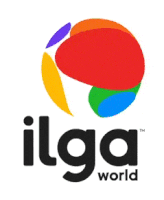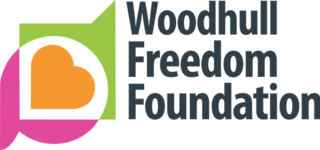Related Research Articles

Lesbian, gay, bisexual, transgender and queer (LGBTQ) movements are social movements that advocate for LGBTQ people in society. Although there is not a primary or an overarching central organization that represents all LGBTQ people and their interests, numerous LGBT rights organizations are active worldwide. The first organization to promote LGBT rights was the Scientific-Humanitarian Committee, founded in 1897 in Berlin.

The International Lesbian, Gay, Bisexual, Trans and Intersex Association (ILGA) is a LGBTQ+ rights organization.
The Employment Non-Discrimination Act (ENDA) is legislation proposed in the United States Congress that would prohibit discrimination in hiring and employment on the basis of sexual orientation or, depending on the version of the bill, gender identity, by employers with at least 15 employees.

Lesbian, gay, bisexual, and transgender (LGBT) people in the Central African Republic face legal and social challenges not experienced by non-LGBTQ residents. Both male and female types of same-sex sexual activity are legal in the Central African Republic, but LGBT persons still face discrimination among the broader population.

Scott Long is a US-born activist for international human rights, primarily focusing on the rights of lesbian, gay, bisexual, and transgender (LGBT) people. He founded the Lesbian, Gay, Bisexual, and Transgender Rights Program at Human Rights Watch, the first-ever program on LGBT rights at a major "mainstream" human rights organization, and served as its executive director from May 2004 - August 2010. He later was a visiting fellow in the Human Rights Program of Harvard Law School from 2011 to 2012.

Lesbian, gay, bisexual, and transgender (LGBT) people in Albania face legal challenges not experienced by non-LGBT residents, although LGBT people are protected under comprehensive anti-discrimination legislation. Both male and female same-gender sexual activities have been legal in Albania since 1995, but households headed by same-sex couples are not eligible for the same legal protections available to opposite-gender couples, with same-sex unions not being recognized in the country in any form.
The Hirschfeld-Eddy Foundation was founded in Berlin in June 2007. It is a foundation focused on human rights of lesbian, gay, bisexual and transgender (LGBTQ) people.

The Woodhull Freedom Foundation, also known as Woodhull Sexual Freedom Alliance, is an American non-profit organization founded in 2003 that advocates for sexual freedom as a fundamental human right. The organization is based in Washington, D.C., United States. Named after an influential member of the American woman's suffrage movement, Victoria Woodhull, its focus includes analyzing groups and individuals that seek to perpetuate a culture of sexual repression.

Lesbian, gay, bisexual, and transgender (LGBT) people in Uganda face severe legal and social challenges not experienced by non-LGBTQ residents. Same-sex sexual activity is illegal for both men and women in Uganda. It was originally criminalised by British colonial laws introduced when Uganda became a British protectorate, and these laws have been retained since the country gained its independence.

LGBT movements in the United States comprise an interwoven history of lesbian, gay, bisexual, transgender and allied social movements in the United States of America, beginning in the early 20th century. A commonly stated goal among these movements is social equality for LGBT people. Some have also focused on building LGBT communities or worked towards liberation for the broader society from biphobia, homophobia, and transphobia. LGBT movements organized today are made up of a wide range of political activism and cultural activity, including lobbying, street marches, social groups, media, art, and research. Sociologist Mary Bernstein writes: "For the lesbian and gay movement, then, cultural goals include challenging dominant constructions of masculinity and femininity, homophobia, and the primacy of the gendered heterosexual nuclear family (heteronormativity). Political goals include changing laws and policies in order to gain new rights, benefits, and protections from harm." Bernstein emphasizes that activists seek both types of goals in both the civil and political spheres.
Rolling Stone was a weekly tabloid newspaper published in Kampala, Uganda. The paper published its first issue on 23 August 2010, under the direction of 22-year-old Giles Muhame and two classmates from Kampala's Makerere University. According to Muhame, the paper's title was derived from the local word enkurungu: "It's a metaphor for something that strikes with lightning speed, that can kill someone if it is thrown at them." The paper was small, with a circulation of approximately 2000 copies. It suspended publication in November 2010 after the High Court ruled that it had violated the fundamental rights of LGBT Ugandans by attempting to out them and calling for their deaths. One of those listed, David Kato, was subsequently murdered.

Sexual Minorities Uganda (SMUG) is an umbrella non-governmental organization based in Kampala, Uganda. It has been described as the country's leading gay rights advocacy group.

David Kato Kisule was a Ugandan teacher and LGBT rights activist, considered a father of Uganda's gay rights movement and described as "Uganda's first openly gay man". He served as advocacy officer for Sexual Minorities Uganda (SMUG).

Kasha Jacqueline Nabagesera is a Ugandan LGBT rights activist and the founder and executive director of the LGBT rights organization Freedom & Roam Uganda (FARUG). She received the Martin Ennals Award for Human Rights Defenders in 2011 and the Right Livelihood Award in 2015.

Frank Mugisha is a Ugandan LGBT advocate and Executive Director of Sexual Minorities Uganda (SMUG), who has won the Robert F. Kennedy Human Rights Award and Thorolf Rafto Memorial Prize 2011 for his activism. Mugisha is one of the most prominent advocates for LGBT rights in Uganda.
galck+, formerly The Gay and Lesbian Coalition of Kenya (GALCK), is the national Sexual Orientation Gender Identity and Expression (SOGIE) umbrella body, representing LGBTQ+ voices across Kenya.

Equal Ground is a non-profit advocacy organization based in Colombo, Sri Lanka, that campaigns for political, social and civilian rights for lesbian, gay, bisexual, transgender (LGBT), intersex and queer individuals. The organization, established in 2004, is one of the first organization in Sri Lanka welcoming and advocating equality for people of all sexual orientations and gender identities.
This is a timeline of notable events in the history of non-heterosexual conforming people of African ancestry, who may identify as LGBTIQGNC, men who have sex with men, or related culturally specific identities. This timeline includes events both in Africa, the Americas and Europe and in the global African diaspora, as the histories are very deeply linked.
References
- ↑ "History". FARUG. 24 June 2011. Retrieved 12 January 2012.
- ↑ Houttuin, Saskia (26 December 2011). "The Day We Said We're Homosexual". All Africa. Retrieved 12 January 2012.
- ↑ "Interview of the Month: June 2011". Universal Periodic Review. June 2011. Archived from the original on 13 October 2011. Retrieved 12 January 2012.
- ↑ "Courage is our virtue and freedom is our goal". United Nations Office of the High Commissioner for Human Rights. 31 October 2011. Retrieved 12 January 2012.
- ↑ "Profile". FARUG. 22 April 2011. Retrieved 12 January 2012.
- ↑ "Ugandan paper calls for gay people to be hanged". The Guardian. 21 October 2010. Retrieved 12 January 2012.
- ↑ "Uganda gay activist Kasha Jacqueline Nabagesera hailed". BBC. 4 May 2011. Retrieved 12 January 2012.